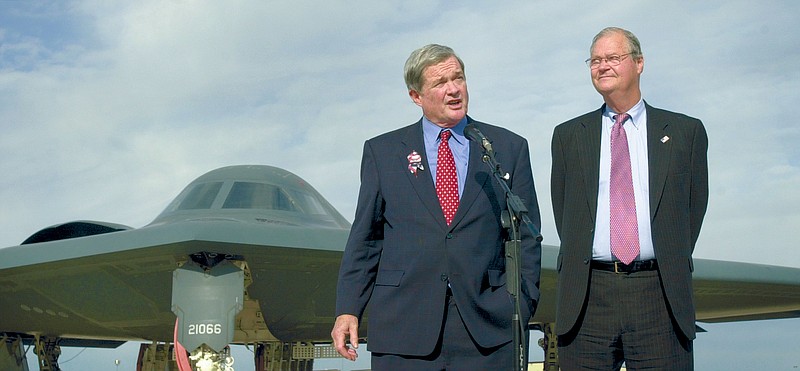Ike Skelton dreamed of having a military career.
But polio got in the way of that dream in 1947 - his sophomore year at Wentworth Military Academy - attacking his arms and upper body, and making difficult or impossible many of the things most of us do without thinking.
But his interest in the military didn't die in 1947, with his new inability to become a soldier.
Instead, he would note in later years, his military interests were redirected into his long work in Congress and his membership on the U.S. House Armed Services Committee - which he chaired from November 2007-January 2011.
Skelton, 81, died Monday at a Virginia hospital.
"Being with Ike was a wonderful experience," former U.S. Rep. Duncan Hunter, R-Calif. (San Diego), said during a telephone interview Tuesday morning.
They served on the Armed Services Committee together for 28 years.
During the past few years, they each served as chairman while the other was the committee's "ranking," or top minority-party, member.
"Regardless of our particular position with respect to a military operation," Hunter recalled, "always a large dimension of our relationship was a partnership for the benefit of the troops.
"In the areas of force protection, pay and allowances and military family issues, we were always on the same page."
Often, after strong disagreements during committee meetings or House debate, they would get together as friends to talk about their families, including their two sons each serving in the military, and other personal things.
"His friendship and his personality and sincerity always transcended the political debate of the day," Hunter said. "That's a very important thing in making this government work."
Steve Danner, the Missouri National Guard's current adjutant general, remembers passing out Skelton campaign literature when he was young.
"I had contact with him all the way through the 1980s," when Danner was a state representative and state senator, he said Tuesday.
When Gov. Jay Nixon named Danner to head the National Guard in 2009, he said, "It was on an (almost) every-other day basis that (Skelton and I) were talking, because there was just so much going on.
"A lot of times, it was his mentoring me because he knew more about what was going on in the Guard than some of our leadership did at the time. ... His personal advice to me on military matters, both state and federal ... was invaluable."
Danner said Skelton recognized the importance of the Guard and Reserve units as key components of the nation's total military picture.
And building up Fort Leonard Wood's training facilities "really set us up for success when it came to this long war that we've been fighting these last 12 years, or so," Danner said.
Following the 1980 redistricting, Skelton's 4th District in Missouri included both the Army's Fort Leonard Wood and Whiteman Air Force Base. Hunter's district in southern California included the vast Navy operations at San Diego and the U.S. Marines' compound at Twentynine Palms.
"We engaged in the common cause of trying to keep the military establishment - all branches of the service - strong," Hunter said, whether based in their own districts, or not.
Both congressmen supported the 1980s military build-up under President Ronald Reagan that many credit with ending the Cold War with Russia - including across-the-board improvements in pay, better equipment and supplies.
Both fought the Bill Clinton Administration's "far too severe" cuts into the military's size during the 1990s, Hunter noted.
"I think Ike Skelton always did what he thought was right for the country," he said.
Danner agreed that Skelton "knew what needed to be done" for all branches of the service.
At the same time, Danner added, "His knowledge was so vast in the military side, I don't think that very many people would challenge, or could challenge, his opinion.
"He always knew what he was talking about."
Skelton took pride in his study of wars and military issues throughout history.
He was a strong supporter of the military colleges where those issues - as well as other needs - could be studied by modern civilian and military leaders.
"I often referred to Ike as the corporate memory of the (Armed Services) committee on military history - who could reach back, retrieve history and apply it to the present-day issues," Hunter said. "It was extremely helpful to all the discussions.
"I'm a student of military history also, but I didn't focus nearly as much as Ike did - but I always appreciated it and I think all the members of the committee did."
Danner said Skelton's death "was a sad day for Missouri and the nation."
Hunter said: "Ike Skelton was a statesman, a wonderful family man and a friend.
"And I will miss him greatly."

